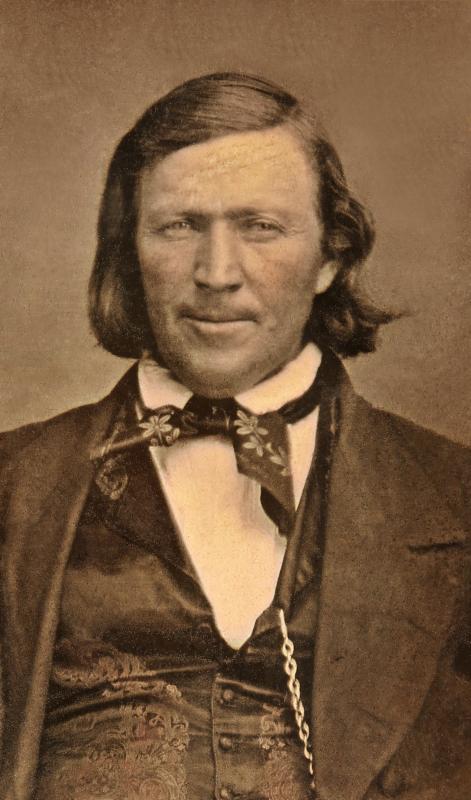1.3 Excerpt from Governor's Message, January 5, 1852
Brigham Young opened the legislative session on January 5, 1852, with a prepared speech which his secretary Thomas Bullock read to a joint session of the legislature.
Document Introduction
The trial of Don Pedro León Luján was clearly on Brigham Young’s mind as the 1852 term of the legislative session began. In fact his opening speech to the legislature fit chronologically in between the two phases of the trial. The jury handed down its verdict in the first phase of the trial on January 1, 1852. On January 3 and 4, Young worked with the clerks at the Church Historian’s Office on the speech that would open the legislative session. On January 5, Young’s secretary Thomas Bullock delivered the written speech on Young’s behalf to a combined session of the territorial Council and House of Representatives. He addressed Native American slavery and African American slavery in the speech and declared his dislike for both. “My own feelings are, that no property can or should be recognized as existing in slaves, either Indian or African” he said. Yet in the same speech he also justified “servitude” and argued that the “seed of Canaan” was inferior to white people.
Of immediate concern was the traffic in Indian slaves which Young believed traders from New Mexico both facilitated and incentivized. “The practice of purchasing Indian children for slaves, is a trade carried on by the Mexican population of New Mexico and California,” he explained. He specifically mentioned the Spanish traders he had recently encountered in the territory and noted that he “strictly prohibited their further traffic.” Those who persisted in their “nefarious” business, he noted, were arrested and were “now on their trial in this city.”
When Mormons purchased the children, however, Young believed they were rescuing them and providing a better life for them. Similar to John Greiner’s later justifications as New Mexico’s Indian agent, Young claimed that “many a life by this means is saved; many a child redeemed from the thralldom of savage barbarity, and placed upon an equal footing with the more favored portions of the human race.” When Mormons purchased the children from their captors, the children were then in debt to their benefactors and “service” might be considered due. As a result, Young prodded, it was “necessary that some law should provide the suitable regulations under which all such indebtedness should be defrayed.”
Thomas W. Ellerbeck, a clerk in the Church Historian’s Office, worked on Young’s speech in advance of its delivery and likely helped to shape its style which was written in longer sentences and was more fluid than was typical when Young spoke extemporaneously. Yet, Young’s ideas are clearly present. The speech was wide ranging and addressed a variety of issues which lawmakers had under consideration for the 1852 legislative session, from Mormon settlement efforts, to home manufacturing, and from education to taxes. As a part of his vision for an economically self-sufficient people Young was concerned about the Saints’ ability to produce what they would consume. He also perceived a need for the rising generation to acquire a diverse set of practical skills in order to meet the needs of a growing frontier community. He bemoaned the fact that he “scarcely” knew of “an apprentice to any trade” in the territory. There were “no young mechanics arising to fill the places of those now at labor,” he worried. In response, he urged the legislature to frame “wise and salutary laws in relation to Master and Apprentice.”
Clearly labor categories were on Young’s mind as the legislative session began and the laws which lawmakers passed reflected their responses to Young’s desires. It was no coincidence that when they wrote the Indian indenture bill, lawmakers legally defined the Indians who Mormons purchased as “apprentices” and stipulated that masters bind their apprentices “to some useful avocation.” The document below is an excerpt from Young’s much longer speech and includes only the portion in which he deals with Indian and African-American slavery.


